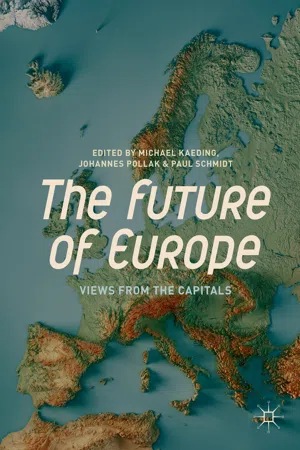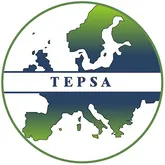
The Future of Europe
Views from the Capitals
- English
- ePUB (mobile friendly)
- Available on iOS & Android
The Future of Europe
Views from the Capitals
About This Book
With a Foreword by the President of the European Parliament, Antonio Tajani.
This book sheds light on the political dynamics within the EU member states and contributes to the discussions about Europe. Authors from all member states as well as Iceland, Norway, Switzerland and Turkey assess how their country could get more involved in the European debate, taking the reader on a journey through various political landscapes and different views. The chapters cover issues ranging from a perceived lack of ambition at the periphery to a careful balancing act between diverse standpoints at the geographical centre. Yet, discussions share common features such as the anxiety regarding national sovereignty, the migration and border discourse, security concerns as well as the obvious need to regain trust and create policies that work. The book contributes vigorously to the debate about Europe in all capitals and every corner of the continent, because this is where itsfuture will be decided.
Frequently asked questions
Information




Table of contents
- Cover
- Front Matter
- Austria in Europe: Size Matters: But so Do Ideas
- Belgium in Search of a Stance on Today’s EU Integration Dilemmas
- Bulgaria: More Europe in Domestic Politics
- Croatia: Finally in the EU but Still in Search for a Place Under the (EU) Sun
- A Future Europe for Cyprus: A Struggle to Overcome the Utopianism of the 1990s and Come to Terms with the Tough Pragmatism of the 2020s
- Czech Republic: A Paradise for Eurosceptics?
- The Schizophrenic Danes
- Has the Estonian e-Tiger Been Caught Napping?
- Bridging the EU’s Political Dividing Lines Is in Finland’s Security Interest
- France: Supporting the Jobless – A Job for Europe
- Germany and the EU: Managing Differentiation to Avoid Structural Segregation
- Greece: Of “Future of Europe” Plans and Political Honesty
- Hungary: Becoming Pioneers Again
- Active Participation, an Icelandic-German Alliance and United Nordic Front
- Ireland and the EU: A Pragmatic Approach to Integration
- Italy and the EU: A Relationship with Uncertain Outcomes
- Latvia’s Future in a Deepened EU: Fine with the Right Wine
- Lithuania and the EU: Pragmatic Support Driven by Security Concerns
- Luxembourg and the EU: How to Integrate in the Face of Diversity
- Malta: Small and Peripheral but Aiming for the Core of Europe
- The Netherlands and the EU: Strengthening but Not Centralising the EU
- Exit, Voice, and Loyalty: Norway’s Options
- Solidarity with Poland but Not from Poland
- The Bell Has Rung: Portugalʼs Main Bet Is on the Conclusion of the EMU
- The EU’s Young and Restless Democracy: Romania’s Lessons and Contribution
- Being European: The Slovak Way
- Slovenia: From High Enthusiasm to Frustrating Indifference
- Spain in the EU: Eager to Regain Centrality
- Managing the Risk of Periphery: Sweden and the Future of the EU
- Towards a “Reset” of EU-Swiss Relations?
- Like a Candle in the Wind? Insights and Recommendations on the Turkish Accession to the EU
- The Union after Brexit: Disintegration, Differentiation or Deepening?
- Correction to: The Future of Europe
- Back Matter